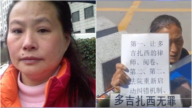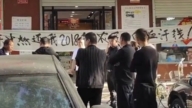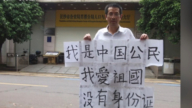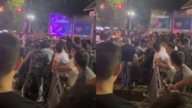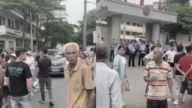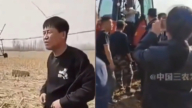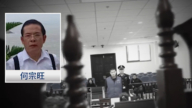【新唐人2011年4月29日讯】过去曾因为华盛顿和北京之间意见分歧,而受到挫折的“美中人权对话”,27号在北京展开两天,28号已经结束。美方代表助理国务卿波斯纳表示,美方关注到中国人权情况有倒退现象,而大陆外交部提出警告,反对(美国)以人权争议作为“干预中国内政的借口”。美中分歧似乎仍然难以消弥。
美中最新一轮的人权对话已经结束,美方代表、美国助理国务卿迈克尔.波斯纳(Michael Posner)在会后召开记者会。来自《香港电台》的报导,波斯纳说,美方关注到大陆内地人权情况有倒退现象,有维权律师、博客及艺术家被当局禁锢及无故失踪。会上,他提出了关注维权艺术家艾未未的情况,但他不满意对方的答复。
波斯纳也不认同,中共批评“西方国家利用人权问题,干涉中国内政”的说法。
海外中国民主党联合总部主席徐文立,是美中人权对话的受益者,他先后被中共判刑28年,美中人权对话后,他从监狱直接到了美国,但他对人权对话的效果仍表示否定。
徐文立(海外中国民主党联合总部主席):“美中人权对话,在目前来看并不能改变中国人权恶化的局面,大家知道,长期以来法轮功受到迫害,并没有得到中共的认罪和道歉,长期为法轮功学员辩护的高智晟先生至今下落不明,最近我们民主党人刘贤斌再次被捕、判刑,10年的重刑。”
徐文立还表示,象艾未未这样典型的案例以外,还有大规模的异议人士和维权律师“被喝茶”、被警告、被限制自由。徐文立认为:目前中国的人权状况在进一步恶化。
徐文立:“中国政府也签署了国际人权公约,他有责任履行它的国际义务。但是,从目前来看,它无意改变一党专制这样一种政治体制。目前情况是在恶化当中,特别是,专制机器更加黑社会化倾向,需要国际社会的高度关注。”
权利运动人士胡军也不看好美中人权对话。
胡军(权利运动人士):“国际上看到中国是一个庞大的市场,在经济利益上考虑的话,各个国家纵容中共的恶行,他们在某些方面对中共做一些妥协让步,它们从中获得一些经济利益,而真正忽视百姓的生命权利、生存的权利。”
中国人权活动家唐伯桥认为,美国要采取强烈措施才能起到一定效果,否则就没有必要进行人权对话了。
唐伯桥(中国人权活动家):“据了解,美国至少掌握了5千部级以上中共官员和家人,在瑞士银行、在美国和全世界各地的资产,具体银行数目和资产,我想都是为了未雨先筹,为了将来一旦中共翻脸了,或狗急跳墙的时候,美国好有办法制裁它。”
一年一度的“美中人权对话”从1990年开始,这次的对话是双方第16次人权对话。在2004年到2008年之间曾经暂停,原因是北京不满华盛顿支持联合国人权委员会一项批评中共的决议。上次美中人权对话在去年—-2010年举行。
新唐人记者常春、宋风、王明宇采访报导。
2011 U.S.-China Human Rights Dialogue
Differences remain in US-China human rights dialogue
U.S.-China Human Rights Dialogue took place
between April 27 and 28. U.S.
Assistant Secretary of State, Posner said
that the U.S. is concerned about the regress
in China’s human rights situation.
Yet mainland China Ministry of Foreign Affairs
warned the U.S. not to interfere in China’s
internal affairs through human rights issues.
The differences seem hard to dissipate.
The latest round of U.S.-China dialogue
on human rights has ended. After the meeting,
Michael Posner, the U.S. representative and
Assistant Secretary of State, held a press conference.
According to Radio Television Hong Kong,
Posner said the U.S. is concerned of the regress
in human rights situation in mainland China:
lawyers, bloggers, artists have been detained
by the authorities or disappeared without a trace.
He raised concerns about the artist Ai Weiwei,
but was not satisfied by China’s reply.
Posner did not agree with China’s argument
that the “Western countries use human rights
to interfere with China’s internal affairs."
Xu Wenli, Chairman of the Joint Headquarters
of Overseas Chinese Democratic Parties, said that
this is beneficial for the U.S. human rights dialogue.
He had been sentenced for 28 years
in communist China and came directly from prison,
after the U.S.-China Human Rights Dialogue.
Xu Wenli: “At present, U.S.-China Human Rights
Dialogue cannot change the deteriorating
human rights situation in China. We all know,
that the persecution of Falun Gong has been long,
yet Chinese communists did not apologize.
Gao Zhisheng, who had long defended Falun Gong,
is still missing. The Democratic Party member,
Liu Xianbin was recently arrested again
and sentenced to 10 years."
Xu Wenli said that Ai Weiwei is a typical case,
in addition to the large number of dissidents
and human rights lawyers who
“are forced to tea together," warned and restricted.
China’s human rights situation is deteriorating.
Xu: “The Chinese government has signed
international human rights conventions and it has
responsibility to fulfill its international obligations.
But for now, it has no intention to change
the one-party rule system.
The situation is deteriorating. In particular,
the current tendency of the authoritarian machine
to turn into a triad requires international attention."
Human rights activist Hu Jun is not optimistic
about U.S.-China Human Rights Dialogue.
Hu Jun: “The international community sees China
as a huge market, in the word of economic interests,
all countries condoning the evil CCP
(Chinese Communist Party) somehow compromise
with the CCP due to economic benefits,
ignoring people’s normal right to life and existence."
Chinese human rights activist Tang Boqiao said,
the United States needs to take strong measures
in order to play a certain effect, otherwise
there would be no need for human rights dialogue.
Tang Boqiao: “It is understood that the U.S. know
the assets and accounts of at least 5,000 communist
party officials and family members
at a ministry level or above, placed in Swiss banks,
United States banks and around the world.
I think they are getting prepared,
in case the CCP turns hostile or gets cornered,
the United States has the means to sanction them."
The annual U.S.-China Human Rights Dialogue
began in 1990. This year is the 16th dialogue.
It was suspended between 2004 and 2008 after
Beijing was displeased by Washington’s support
of UN Commission on Human Rights’ resolution
criticizing the Chinese communists.
Last U.S.-China Human Rights Dialogue
was held in 2010.
NTD reporters Chang Chun, Song Feng and Wang Mingyu


